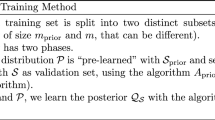Abstract
In this paper we prove various results about PAC learning in the presence of malicious and random classification noise. Our main theme is the use of randomized hypotheses for learning with small sample sizes and high malicious noise rates. We show an algorithm that PAC learns any target class of VC-dimension d using randomized hypotheses and order of d/ε training examples (up to logarithmic factors) while tolerating malicious noise rates even slightly larger than the information-theoretic bound ε/(1+ε) for deterministic hypotheses. Combined with previous results, this implies that a lower bound d/Δ+ε/Δ 2 on the sample size, where η=ε/(l+ε)−Δ is the malicious noise rate, applies only when using deterministic hypotheses. We then show that the information-theoretic upper bound on the noise rate for deterministic hypotheses can be replaced by 2ε/(l+2ε) if randomized hypotheses are used. Investigating further the use of randomized hypotheses, we show a strategy for learning the powerset of d elements using an optimal sample size of order dε/Δ 2 (up to logarithmic factors) and tolerating a noise rate η=2ε/(l+2ε)−Δ. We complement this result by proving that this sample size is also necessary for any class C of VC-dimension d.
We then discuss the performance of the minimum disagreement strategy under both malicious and random classification noise models. For malicious noise we show an algorithm that, using deterministic hypotheses, learns unions of d intervals on the continuous domain [0, 1) using a sample size significantly smaller than that needed by the minimum disagreement strategy. For classification noise we show, generalizing a result by Laird, that order of d/εΔ 2) training examples suffice (up to logarithmic factors) to learn by minimizing disagreements any target class of VC-dimension d tolerating random classification noise rate η=1/2−Δ. Using a lower bound by Simon, we also prove that this sample size bound cannot be significantly improved.
Preview
Unable to display preview. Download preview PDF.
Similar content being viewed by others
References
D. Angluin and P.D. Laird. Learning from noisy examples. Machine Learning, 2:343–370, 1988.
N. Cesa-Bianchi, E. Dichterman, P. Fischer, and H. Simon. Noise-tolerant learning near the information-theoretic bound. In Proceedings of the 28th ACM Symposium on the Theory of Computing. ACM Press, 141–150, 1996.
A. Ehrenfeucht, D. Haussler, M. Kearns, and L. Valiant. A General Lower Bound on the Number of Examples Needed for Learning. Information and Computation, 82(3):247–261, 1989.
M. Kearns and R.E. Schapire. Efficient distribution-free learning of probabilistic concepts. Journal of Computer and Systems Sciences, 48(3):464–497, 1994. An extended abstract appeared in the Proceedings of the 30th Annual Symposium on the Foundations of Computer Science.
M. J. Kearns, R. E. Schapire, and L. Sellie. Toward Efficient Agnostic Learning. Machine Learning, 17(2):115–141, 1994.
M.J. Kearns and M. Li. Learning in the presence of malicious errors. SIAM Journal on Computing, 22(4):807–837, 1993. A preliminary version appeared in the Proceedings of the 20th ACM Symposium on the Theory of Computation.
P.D. Laird. Learning from Good and Bad Data. Kluwer, 1988.
H.U. Simon. General bounds on the number of examples needed for learning probabilistic concepts. Journal of Computer and Systems Sciences, 52:239–254, 1996.
L. Valiant. A theory of the learnable. Communications of the ACM, 27(11):1134–1142, 1984.
V.N. Vapnik. Estimation of Dependences Based on Empirical Data. Springer Verlag, 1982.
Author information
Authors and Affiliations
Editor information
Rights and permissions
Copyright information
© 1997 Springer-Verlag Berlin Heidelberg
About this paper
Cite this paper
Cesa-Bianchi, N., Fischer, P., Shamir, E., Simon, H.U. (1997). Randomized hypotheses and minimum disagreement hypotheses for learning with noise. In: Ben-David, S. (eds) Computational Learning Theory. EuroCOLT 1997. Lecture Notes in Computer Science, vol 1208. Springer, Berlin, Heidelberg. https://doi.org/10.1007/3-540-62685-9_11
Download citation
DOI: https://doi.org/10.1007/3-540-62685-9_11
Published:
Publisher Name: Springer, Berlin, Heidelberg
Print ISBN: 978-3-540-62685-5
Online ISBN: 978-3-540-68431-2
eBook Packages: Springer Book Archive




